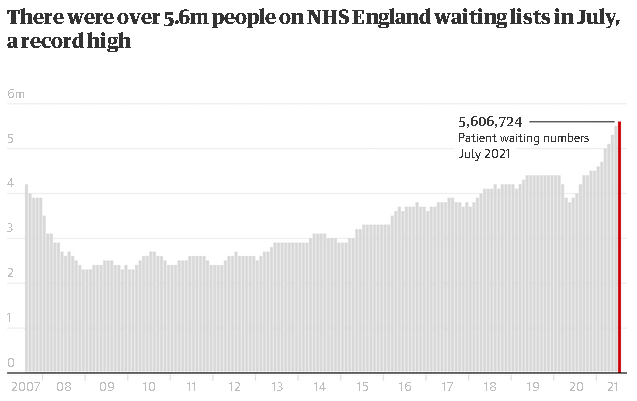Number highest since records began in 2007, while 293,000 have been waiting more than a year
The number of people waiting for hospital treatment in England has hit a record high of 5.61 million, as the NHS struggles to clear the growing backlog of care caused by Covid-19.
It means 1.4 million more patients are waiting for procedures such as a hip or knee replacement or cataract removal than when the pandemic struck in March 2020, forcing the suspension of much NHS care such as diagnostic tests and surgery.
The waiting list is now growing in size by about 150,000 a month as more people who did not seek or could not access NHS treatment over the last 18 months visit a GP and are referred to hospital.
The NHS England performance statistics released today showed that 1.8 million of the 5,606,724 people who were waiting for care in July had already waited at least 18 months. That is more than double the 860,309 people who were in that situation in March 2020.
Hospitals – which are facing staff shortages and unprecedented demand for care – are failing to fulfil the promise enshrined in the NHS constitution to treat 92% of those on the Referral to Treatment (RTT) waiting list within 18 weeks. One NHS leader said the new data showed that “certain parts of the health service are under almost impossible pressure”.
The latest rise in the backlog comes two days after Boris Johnson identified it as the main reason for giving the NHS in England about £10bn a year extra funding over the next three years, using income from the 1.25-percentage-point rise in national insurance dubbed the “health and social care levy”, and said it would pay for “the biggest catch-up programme in the history of the NHS”.
Amid warnings that the waiting list could hit 10 million this year and 13 million soon after that, the prime minister acknowledged that “waiting lists will get worse before they get better”.

He pledged to increase hospital capacity by 10% and enable 9m more appointments, scans and operations to take place, and said 30% more patients who needed non-urgent care such as cancer screening would be able to get it by 2024-25. However, he gave no details of the “plan” that has apparently been drawn up with NHS England to achieve these ambitious targets.
The British Medical Association has called the backlog “gargantuan and unprecedented”. Doctors fear that some patients’ health will deteriorate, potentially to the point where treatment is ineffective, and even that some may die as a result of long delays. The ballooning waiting list is linked to Britain’s low numbers of doctors and hospital beds relative to EU nations, the BMA said.
Responding to Thursday’s grim new figures, Tim Mitchell, a vice-president of the Royal College of Surgeons of England, said: “Behind these eye-watering statistics are patients waiting in pain for hip and knee replacements and for heart, brain and other operations. Without surgery, many would be left unable to work or carry out everyday activities, their quality of life greatly diminished.”
The data also showed that 7,980 patients have been waiting for more than two years for treatment. This is 39% up on the 5,727 such cases the previous month. The 7,980 include people waiting for trauma and orthopaedic treatment, such as a joint replacement (1,732), general surgery such as a gallbladder removal or hernia repair (982), and ear, nose and throat treatment (842).
NHS Providers and the NHS Confederation, which represent the 213 health service trusts in England, warned this week that it could take up to seven years to clear the backlog. The Health Foundation estimates that the NHS will need to spend £16.8bn on “recovery” of pre-pandemic waiting times by the end of this parliament in December 2024.
Thursday’s figures also showed that:
* Just 66.2% of people arriving at hospital-based A&Es in August were seen within four hours, the lowest percentage ever – the target is 95%.
* The median waiting time for people awaiting a referral in July for treatment rose to 10.9 weeks – up from 10.4 weeks the previous month.
* he number of cancer patients having their first treatment within two months of referral by their GP was 72% in July – well below the 85% expected.
NHS England pointed to the fact that hospitals undertook 3.9m diagnostic tests and began treating 2.6 million people in June and July, even though they were also looking after thousands of Covid patients.
“Caring for 450,000 patients with the virus has inevitably had a knock-on effect on less urgent care and left a backlog. But staff are working around the clock to make the best possible use of government investment to treat as many people as possible,” said Prof Stephen Powis, NHS’s England’s national medical director.















